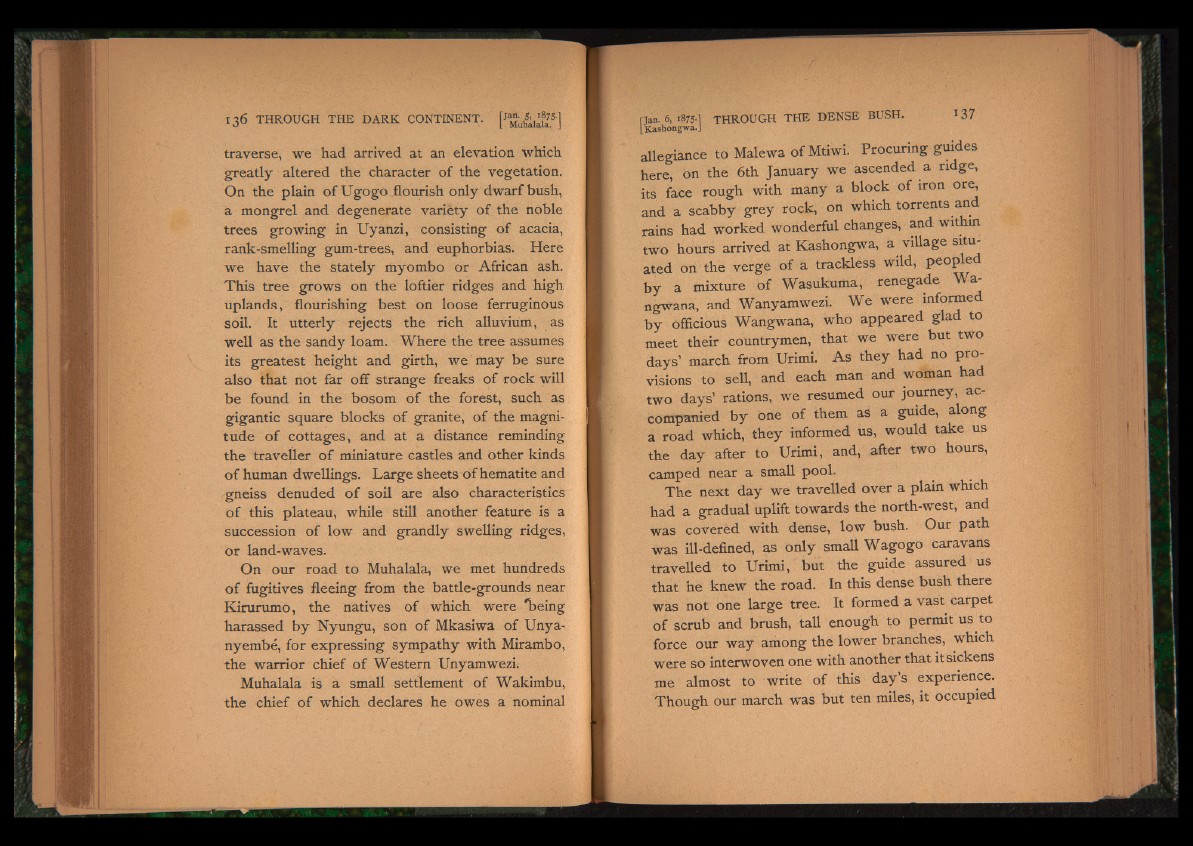
traverse, we had arrived at an elevation which
greatly altered the character o f the vegetation.
On the plain o f U go go flourish only dwarf bush,
a mongrel and degenerate variety o f the noble
trees growing in Uyanzi, consisting o f acacia,
rank-smelling gum-trees, and euphorbias. Here
we have the stately myombo or African ash.
This tree grows on the loftier ridges and high
uplands, flourishing best on loose ferruginous
soil. It utterly rejects the rich alluvium, as
well as the sandy loam. Where the tree assumes
its greatest height and girth, we may be sure
also that not far o ff strange freaks o f rock will
be found in the bosom o f the forest, such as
gigantic square blocks o f granite, o f the magnitude
o f cottages, and at a distance reminding
the traveller o f miniature castles and other kinds
o f human dwellings. L arge sheets o f hematite and
gneiss denuded o f soil are also characteristics
o f this plateau, while still another feature is a
succession o f low and grandly swelling ridges,
or land-waves.
On our road to Muhalala, we met hundreds
o f fugitives fleeing from the battle-grounds near
Kirurumo, the natives o f which were *being
harassed b y Nyungu, son o f Mkasiwa o f Unya-
nyembe, for expressing sympathy with Mirambo,
the warrior chief o f Western Unyamwezi.
Muhalala is a small settlement o f Wakimbu,
the chief o f which declares he owes a nominal
rJan. 6, 1875-1 THROUGH THE DENSE BUSH. 137
[Kashongwa.J
allegiance to Malewa o f Mtiwi. Procuring guides
here, on the 6th January we ascended a ndge,
its face rough with many a b lo ck o f iron ore,
and a scabby g rey rock, on which torrents and
rains had worked wonderful changes, and within
two hours arrived at Kashongwa, a village situated
on the verge o f a trackless wild, peopled
b y a mixture o f Wasukuma, renegade Wa-
ngwana, and Wanyamwezi. W e were informed
b y officious Wangwana, who appeared glad to
meet their countrymen, that we were but two
days’ march from Urimi. A s th ey had no p rovisions
to sell, and each man and woman had
two days’ rations, we resumed our journey, accompanied
b y one o f them as a guide, along
a road which, they informed us, would take us
the day after to Urimi, and, after two hours,
camped near a small pool.
T h e next day we travelled over a plain which
had a gradual uplift towards the north-west, and
was covered with dense, low bush. Our path
was ill-defined, as only small W a g o g o caravans
travelled to Urimi, but the guide assured us
that he knew the road. In this dense bush there
was not one large tree. It formed a vast carpet
o f scrub and brush, tall enough to permit us to
force our w a y among the lower branches, which
were so interwoven one with another that it sickens
me almost to write o f this d a y ’s experience.
Though our march was but ten miles, it occupied